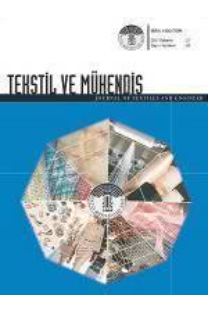Türkiye’deki Büyük Beden Kadın Giyimindeki Problemleri Belirlemeye Yönelik Anket Çalışması
Plus-size clothing, fit, design, survey, 3D body scanning technologies, seamless garment technology, functional clothing
Survey Study for Detection of Problems in Plus-Size Women’s Clothing in Turkey
Büyük beden giyim, bedene uygunluk, tasarım, anket, 3D vücut tarama teknolojileri, dikişsiz giysi teknolojisi, fonksiyonel giysiler,
___
- Ministry of Health of Turkey General Directorate of Primary Health Care (2010). Obesity Prevention and Control program of Turkey (2010-2014), Kuban Matbaacılık, Ankara.
- World Health Organization (WHO), Obesity. www.who.int/topics/obesity/en/ (20.03.2016).
- Yıldıran, F., (2006), Obezite Hastalarının Giyim Problemleri,Master Thesis, Selçuk University Department of Clothing Industry and Fashion Design Education.
- ASTM International, (2004), D6960-04 Standard Table of Body Measurements Relating to Women’s Plus-size Figure Type, Sizes 14W–32W, ASTM Book of Standards www.astm.org/standards/D6960.htm (23.03.2017)
- Ashdown, S. P., (2007), Sizing in Clothing: Developing Effective Sizing Systems for Ready-to-Wear Clothing, Woodhead Publishing, Cambridge.
- Cihangir, E., (2002), Hazır Giyimde Ölçüler, ITKIB Teknik El Kitapları Serisi, İstanbul Tekstil ve Konfeksiyon İhracatçı Birlikleri Genel Sekreterliği, İstanbul.
- Kaynak, M., (2005), Büyük Beden Tüketicisi Bayanların Büyük Beden Kıyafetlerden Ceket ve Pantolonda Karşılaştıkları Model ve Kalıp Kaynaklı Problemlere İlişkin Görüşlerinin İncelenmesi, Master Thesis, Gazi University Department of Clothing Industry and Fashion Design Education, Ankara.
- Safa, S., (2007), Akdeniz Bölgesinde Yaşayan Büyük Beden Bayan Tüketicilerin Hazır Giyim Ürünlerinde Karşılaştıkları Problemler, Master Thesis, Gazi University Department of Clothing Industry and Fashion Design Education, Ankara.
- NPD Group Reports, (2012), Size Matters to American Women, https://www.npd.com/wps/portal/npd/us/news/press-releases/pr_120910/ (23.03.2017).
- IBIS World, (2016), Plus-Size Women’s Clothing Stores Market Research Report, http://www.ibisworld.com/industry/plus-size-womens-clothing-stores.html (23.03.2017).
- Parker, P. M., (2010), The 2011-2016 World Outlook for Women’s Plus-size Clothing, Icon Group International Inc. www.icongroupline.com (10.11.2012).
- http://dictionary.cambridge.org/dictionary/english/latent-demand (23.03.2017).
- Alexander, M., Pisut, R. G., Ivanescu, A., (2011), Investigating Women’s Plus-size Body Measurements and Hip Shape Variation Based on Size USA Data, International Journal of Fashion Design, Technology and Education, 5 (1): 3-12.
- Pisut, G., Connell, L. J., (2007), Fit Preferences of Female Consumers in the USA, Journal of Fashion Marketing and Management, 11(3): 366–379.
- O’Brien, R., Shelton, W. C., (1941), Women’s Measurements for Garment and Pattern Construction. Miscellaneous Publication, Washington.
- Czerniawski, A. M., (2015), Fashioning Fat: Inside Plus-Size Modeling, NYU Press, New York.
- Christel, D. A., (2016), The Efficacy of Problem-based Learning of Plus-size Design in the Fashion Curriculum, International Journal of Fashion Design, Technology and Education, 9 (1): 1-8.
- Mayo Clinic, Belly Fat in Women: Taking and Keeping It Off, http://www.mayoclinic.org/healthy-lifestyle/womens-health/in-depth/belly-fat/art-20045809 (15.06.2017).
- Loker, S., Ashdown, S., Carnrite, E., (2008), Dress in the Third Dimension: Online Interactivity and Its New Horizons, Clothing and Textiles Research Journal, 26 (2): 164-176.
- Dayık, M., Kodaloğlu, M., Güler, Ç., Sivrikaya, D., (2008), 3Boyutlu Vücut Tarama Sistemleri, Tekstil Teknolojileri Elektronik Dergisi, (3): 59-76.
- Dikkaya, Ö. G., (2010), Innovative Clothing Design Through the Use of Advanced Textiles in Formation of Fashion Sportswear. Master Thesis, İzmir University of Economics, Design Studies MDes., İzmir.
- O'Mahony, M., Braddock, S. E., (2002), Sportstech: Revolutionary Fabrics, Fashion and Design, Thames & Hudson Ltd., London.
- ISSN: 1300-7599
- Yayın Aralığı: Yılda 4 Sayı
- Başlangıç: 1987
- Yayıncı: TMMOB Tekstil Mühendisleri Odası
HAVA JETLİ İPLİKLERİN DOKUMA KUMAŞ PERFORMANSLARININ DEĞERLENDİRİLMESİ
HÜSEYİN GAZİ TÜRKSOY, Tuğba AKKAYA, SÜMEYYE ÜSTÜNTAĞ
Ayşe Selcen ALTINOK, Hafız Z. ALİSOY, Buket GELİR ÇINAR
KAPLAMANIN KORUYUCU ELDİVENLERİN PERFORMANS ÖZELLİKLERİNE ETKİSİ
TAŞ YIKAMANIN DENİM KUMAŞ PERFORMANSI ÜZERİNDEKİ ETKİLERİNİN ARAŞTIRILMASI
Ahmet NERGİS, R. Tuğrul OĞULATA
Taş Yıkamanın Denim Kumaş Performansı Üzerindeki Etkilerinin Araştırılması
Ahmet NERGİS, R. Tuğrul OĞULATA
SICAKLIĞA DUYARLI DERİLERİN YAŞLANMA DAVRANIŞLARI
ARİFE CANDAŞ ADIGÜZEL ZENGİN, Eylül KÜÇÜKAKIN, BEHZAT ORAL BİTLİSLİ
Farklı Eğirme Sistemleriyle Üretilmiş Bobinlerin Renk Değerlerinin Karşılaştırılması
Halil ÖZDEMİR, R.Tuğrul OĞULATA
TÜRKİYE'DEKİ BÜYÜK BEDEN KADIN GİYİMİNDEKİ PROBLEMLERİ BELİRLEMEYE YÖNELİK ANKET ÇALIŞMASI
